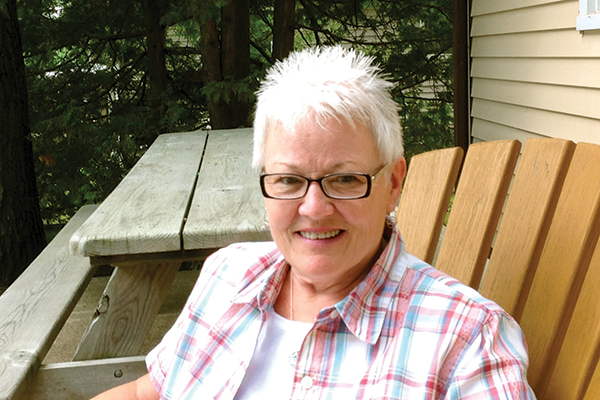Embracing the Positive Side of Cancer
by Susan M. Krauss
Four years ago, I was diagnosed with triple-negative breast cancer. How vividly I remember the negatives: the interminable delays in getting in to see a doctor, the waiting for test results, the waiting in doctors’ offices, the waiting to feel better. Then there were the side effects from chemo: mouth sores, fatigue, diarrhea, constipation, allergic reactions. And the post-treatment period brought worries about my future: What will my life look like now? Will my cancer recur? Where might it metastasize?
There were so many dark, dark days. However, not all the days were dark. Yes, cancer forever changes you. But sometimes it changes you in ways that are good.
Before my diagnosis, I was a recently retired high school English teacher, finally able to spend time with my grandchildren. I had reached my comfort zone. Life was happy.
Then cancer happened, and I often found myself in the company of strangers, regularly surrounded by unfamiliar doctors, chemo nurses, technicians, as well as fellow comrades in the infusion room who were in various stages of hair loss and fatigue. I remember sitting there one day, staring mostly, taking it all in, and feeling confused and frightened, until the lady sitting next to me struck up a conversation. This impromptu conversation ended up lasting about sixteen hours, spread out over four chemo sessions.
The woman was there to support her daughter who had stage IV colon cancer. A cancer survivor herself, she offered me suggestions for tasty recipes that would make my mouth sores feel better. She knew the rash on my arm was an allergic reaction and called the nurse over to have a look. I learned all about her family history; her father, brother, sister, and two children were all cancer survivors. Her late husband had battled cancer too. But he passed twenty years before I met her.
She seemed immune to bad news, calm and pragmatic. “When a problem arises, we just deal with it,” she said. She was so open about her life. I found her struggle and her attitude inspiring.
At my fifth session, she wasn’t there. I was seated in an outside chair near the door. After a while, a man came into the infusion room with an elderly woman; they were led in by a nurse who was showing them around the facility. They stopped near my chair, and the woman started crying. Everyone looked around in embarrassed silence. I went over to her and took her hand, a perfect stranger. “Don’t cry,” I said. “This is a place where good things happen, where you meet some wonderful people who will help you. Try not to be afraid. You’ll see. It’s not
as bad as you feared.”
I went over to her and took her hand, a perfect stranger. “Don’t cry,” I said. “This is a place where good things happen, where you meet some wonderful people who will help you. Try not to be afraid. You’ll see. It’s not as bad as you feared.”
Where did I get the courage to do that? Me, who is usually so reserved and quiet. But that woman was just the first. It happened again in a restaurant when a nearby stranger, noticing my turban, pale complexion, and pink ribbon pinned to my sweater, appeared as if she wanted to say something but couldn’t find the words. I walked over to her. She was scheduled for a lumpectomy just two days later. “Try not to be afraid,” I told her, and we stood there amid the din of clanking glasses and silverware scraping against plates for ten minutes talking about breast cancer.
I was becoming more verbal about this illness we didn’t use to discuss. Mastectomies. Breast reconstruction. Prostheses. I listened to myself talk and realized I had something to say that might help others, just as that lady in the infusion room had helped me. One day a friend called and asked if I could talk to a childhood friend of hers who had recently been diagnosed with breast cancer. I called the woman the next day, and we chatted as though WE had been the childhood friends. We had an instant connection, this common experience of fear, of pain and loss, of searching for hope. Over the next weeks and months, we talked often. This continued even after her treatment ended. We had become great friends, and now instead of talking about cancer, we share about our families, our hopes and desires, our innermost thoughts. What a blessing she is to me.
So, you see, there are some good things that can spring to life amid the destruction of cancer. I emerged a stronger person, more willing to engage with others and share my experience with strangers who seem in need. I gained self-confidence. And I made a true friend and trusted confidante. Could there be any better side effect than that? How ironic that an insidious disease is what led me to it.
Indeed, cancer changes you. It reaches deep within and can take away part of your spirit, but that’s usually temporary. The upside of cancer though, can last much longer if you are open to change and willing to embrace the positives.
Susan Krauss is a breast cancer survivor living in Reese, MI. She is the author of The Book of Jane. You can learn more about Susan at SusanMKrauss.com.
This article was published in Coping® with Cancer magazine, March/April 2016.
Everyone has a unique story to share. Do you want to share your survivor story? We consider a cancer survivor to be anyone living with a history of cancer – from diagnosis through the remainder of life.
Here are our submission guidelines.


